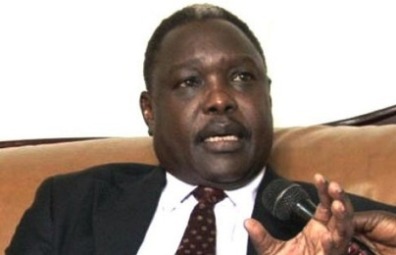South Sudan minister accuses armed opposition of hidden agenda
October 15, 2015 (JUBA) – South Sudan’s cabinet minister has on Thursday accused the leadership of the armed opposition faction under the leadership of former vice-president, Riek Machar, of working to derail the implementation of the peace agreement signed in August.

“The government has started the implementation of the peace agreement. The president had issued an order declaring permanent ceasefire and the council of ministers and the parliament have approved the agreement and now implementation process of the agreement has begun but the rebels have reneged,” Lomoro told Sudan Tribune in an interview on Thursday.
“They [opposition) are violating the agreement and they are now making unnecessary conditions as excuses to not agreeing to sign the minutes of the permanent ceasefire to pave way for complete implementation of the security arrangement. They have another agenda which they want to accomplish through peace,” he further claimed.
Minister Lomuro, who chairs a political party allied to the government, said the pro-government political parties are supportive of the presidential order creating and dividing the country into 28 new states and have therefore issued a statement urging the president not to reverse the order.
“The political parties whose leaders understand the context of the establishment order and who have understood the essence of the order made it very clear at a press conference recently in Juba. The parties said the creation of more states has been a demand of the people of South Sudan and so it should be implemented immediately. It cannot be reversed. Those opposing it [are] doing [it] either out of ignorance or they have a hidden agenda which has nothing to do with the interest of the people of South Sudan,” he said.
The political parties, he said, had during the press conference called on the international community, specifically the United States of America, United Kingdom, Norway, and member states of the European Union and Intergovernmental Authority on Development to respect and support the decision of the president.
However, an alliance of main opposition political parties led by Lam Akol issued a statement accusing president Kiir of violating the country’s constitution and the peace deal in unilaterally creating the 28 states.
Last week, Machar’s opposition faction, former detainees, civil society organizations and members of the international community urged president Kiir to reverse the decision.
Pro-government’s political parties lashed out against the international community, arguing they were trying to undermine administrative and constitutional prerogative of the president and his government in violation of the sovereignty of South Sudan.
“With utter dismay, we the leaders of the political parties of South Sudan noticed that the ambassadors from Troika countries of United States, European Union issued a statement calling on the president to reverse the order. This was clearly outside their diplomatic mandates. It was a clear act of interference in the internal and administrative affairs of a sovereign state,” explained Lomuro.
Embassies in the country, he argued, ought to concentrate on bilateral and diplomatic relationship rather than have ambassadors interfering in the internal affairs to an extent of ordering president of a sovereign nation to withdraw an administrative order.
He said such behaviours undermined not only the authority of the president but also hurt the feeling of the people of South Sudan when they see how their elected president was being humiliated by order of ambassadors.
“I don’t know why this happen here. But I know such practices are never practiced anywhere else in the world except in South Sudan where everybody in the world has the audacity to come out and say anything against the government and the authority of our president. Our people have tolerated such behaviours several times but it has reached a point to say no,” he added.
The government said it will continue with the implementation of the order despite the opposition to the decision.
The armed opposition faction led by Machar however said they would want the minutes to be deliberated on by the two sides and come to an agreement before they could sign them, arguing that the issue was mishandled by the IGAD mediation who allowed the government to ink the minutes without first sharing its contents with all the parties.
Machar’s spokesman, James Gatdet Dak, told Sudan Tribune that their senior commanders were ready to resume the workshop in the Ethiopian capital, Addis Ababa, on the security arrangements so that an agreement is reached for implementation of the security provisions.
He revealed that some of the issues including cantonment/assembly points had already been agreed but the demilitarization of Juba and other major towns including sizes and composition of joint forces had remained contentious.
While the government wanted a huge force of several thousands to remain in Juba, the opposition, he said, wanted a small size of joint forces in accordance with the spirit of the peace agreement which calls for the demilitarization of the capital.
(ST)
